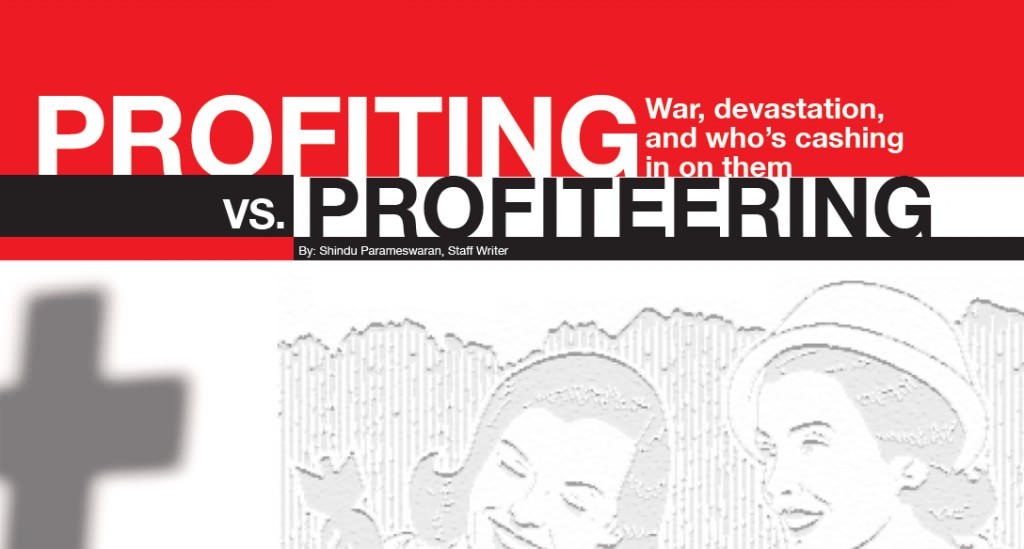Profiting vs. Profiteering
“The Bush administration wanted an effective ‘puppet government’ in Iraq, which allows the U.S. to run the show.”
War, devastation, and who’s cashing in on them
By Shindu Parameswaran, Staff Writer
What’s the relation between a multinational conglomerate like General Electric (GE) and the Iraq war? How do governments, compared to the Bush administration, help companies take advantage of devastated countries involved in wars or recovering from natural disasters? How do credit companies, such as MasterCard, Visa, and American Express, turn a profit from the earthquake in Haiti? All of these questions revolve around a derogatory term: profiteering.
Profiteering—the act of making unreasonable profit by means deemed unethical—has become a more prominent issue since the start of Afghanistan and Iraq wars and in response to the increasingly frequent natural disasters. In particular, the Iraq war has brought about greater awareness to the issue of benefiting unethically.
Albeit the Iraq war cost nearly $3 trillion to the U.S. economy, the war has brought about some winners. For everyone from military contractors to construction companies to suppliers of bodyguards and ammunition, the war in Iraq has been a lucrative “cash cow”.
Arguably, one such company that has greatly benefited from the war in Iraq is KBR Inc., formerly a subsidiary of Halliburton. It’s reported that KBR, one of the largest construction and oilfield service companies in the world, gained $17.2 billion in revenue from 2003 to 2006. This is estimated to be about one-fifth of KBR’s revenue in 2006.
//
//
Likewise, Halliburton, the former parent company of KBR Inc., also benefited from the war as it won a $7 billion oil and infrastructure contract. The relations between Halliburton and the U.S. government have been heavily criticized because of the ties the company had with former CEO and U.S. Vice President at the time, Dick Cheney. This allowed Halliburton to win the $7 billion contract for which, strangely, Halliburton was the only company allowed to bid!
KBR and Halliburton are only a few of the many businesses that have cashed in from the war in Iraq. Veritas Capital Fund, a private equity fund, has also exploited the money-spinning opportunity in Iraq. But how does a private equity fund benefit significantly from the Iraq War? Veritas owns a portfolio of companies—specializing in the defence and aerospace industries—which held large Iraq-associated contracts. DynCorp International, one such company that Veritas held, offered security services, police training and logistical services in Iraq.
[pullquote]This allowed Halliburton to win the $7 billion contract for which, strangely, Halliburton was the only company allowed to bid! [/pullquote]
Other profiteers or enterprises that profited unethically include: Washington Group International and Fluor, both which repaired, restored and maintained oil fields, military bases and municipal utilities; Environment Chemical, which managed the disposal of munitions; International American Products, which provided electricity to military camps; L3 Communications, similar to DynCorp, offered security screening, training and linguistic services as well as law-enforcement services and some replacement of equipment; and Lockheed Martin, which is the largest arms manufacturer in the world.
The above mentioned are only a handful of businesses which were clear winners during the Iraq War. However, these were companies that you and I may not identify off the top of our heads. Did any of the more renowned, recognized companies gain from the Iraq War?
HSBC, the third biggest financial organization on the globe, expanded its wealth with the start of combat in Iraq. The company purchased 70% of Dar Es Salaam Investment Bank, an Iraqi national bank, and converted it into the first private bank in Iraq after the fall of Saddam Hussein’s regime.
As mentioned earlier, GE, the multinational corporation that produces household electrical appliances but also controls NBC, a large media company, was another business which profited by dishonourable means in Iraq. General Electric’s subsidiaries were able to win contracts to supply medical and water purification equipment under the United Nations’ oil-for-food program, which provided aid to Iraq in the prelude to the war. In July 2010, GE was charged by the U.S. Securities and Exchange Commission (SEC) to pay $23.4 million because its subsidiaries had paid illegal kickbacks—some in payments, others in goods and services—to the Iraqi government to win the contracts.
An additional firm that benefited greatly from Iraq was Bechtel, the largest engineering and third largest private company in the United States. It gained a $2.4 billion, no-bid reconstruction contract for Iraq`s infrastructure as a result of its close ties with the Bush administration.
How did these companies—most of which, if not all, were U.S.-based—gain these profitable contracts from the reconstruction and restructuring of Iraq? We need not look far for the answer: the Bush administration.
In an exclusive interview with the Arbitrage, Bill Woof, an Associate Professor who has been teaching Ethics, Social Responsibility and Sustainability at the Schulich School of Business for over ten years, remarked, “The Bush administration clearly planned this invasion not only as a method to provide security for American oil requirements, but also as an original experiment to bring a lot of multinational corporations, which was purposely planned. A number of American corporations, which were all lined up in advance, came into Iraq to capitalize on the underdeveloped economy.”
































Share the post "Profiting vs. Profiteering"